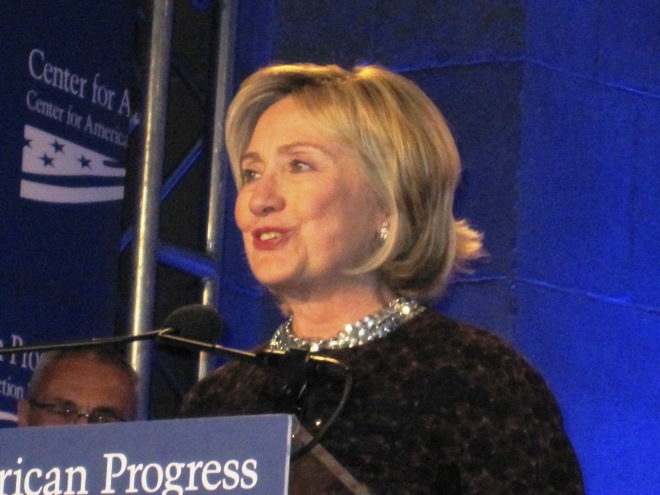Hillary Rodham Clinton Will Be a President Who Believes in Science

With the outbreak of measles in the United States, we once again see a divide on how basic science and research are viewed by the leading members of the Republican and Democratic Parties. President Obama spoke out quickly and decisively. "There is every reason to get vaccinated, but there aren't reasons to not," he said in an interview with NBC News. "I just want people to know the facts and science and the information. And the fact is that a major success of our civilization is our ability to prevent diseases that in the past have devastated folks. And measles is preventable."
It was both fascinating and scary to listen to some contenders for the Republican nomination for president fall over themselves trying to explain why they don't believe in vaccinating their children against measles or why other parents should have the choice not to do so. As reported in The Washington Post, Chris Christie believes parents should have a choice; Rand Paul, an ophthalmologist who isn't certified by the American Board of Ophthalmology, the only recognized body that certifies doctors in his specialty, said, "I have heard of many tragic cases of walking, talking, normal children who wound up with profound mental disorders after vaccines. I'm not arguing vaccines are a bad idea; I think they're a good thing, but I think the parents should have some input. The state doesn't own your children."
Hillary Rodham Clinton tweeted a simple response to those who questioned the use of vaccines: "The science is clear: The earth is round, the sky is blue, and #vaccineswork. Let's protect all our kids. #GrandmothersKnowBest." Other Democrats such as Howard Dean, a doctor and presidential candidate in 2004 and a former chairman of the Democratic National Committee, said there are three groups of people who object to required vaccines:
One is people who are very much scared about their kids getting autism, which is an idea that has been completely discredited. Two, is entitled people who don't want to put any poison in their kids and view this as poison, which is ignorance more than anything else. And three, people who are antigovernment in any way.
These responses to a public health emergency make it more crucial than ever that the American people think long and hard about who they will choose as their next president. It is becoming increasingly clear that the pandering of Republican candidates to the far right of their party will bring forth a candidate who either doesn't understand or won't base their decisions on scientific research.
Hillary Rodham Clinton has always spoken out for making decisions based on the best scientific knowledge, and for funding basic scientific research so that we have the information we need to keep the American people safe and healthy. In 2008 Clinton said she was willing to see additional research on the safety of vaccines. Now that research is conclusive; vaccines are safe.
One of the most uplifting speeches I have heard Hillary deliver was to an audience at the Carnegie Institute of Science in 2008, on the anniversary of Sputnik. In that speech she said:
When science is politicized, when the truth is subjugated by ideology, it's worse than wrong -- it's dangerous. Ending the war on science and once again valuing the ever-skeptical but always hopeful scientific enterprise is about more than our economy. It's about more than our security. It is about our democracy.
She went on to quote Daniel Patrick Moynihan, the late senator from New York, who said, "Everyone is entitled to his own opinion, but no one is entitled to his own facts."
The Republican candidates who question the use of vaccines are basing their opinions on their own facts. They ignore the research and, in doing so, put the public's health in danger. It now appears even worse. They are forming their opinions for purposes of political pandering. We need to elect a president who will base her decisions on scientific research, not on perceived popular opinion for political gains.
We know we can trust Hillary Rodham Clinton when it comes to funding basic science and then making decisions on the best evidence available. We know it from listening to her talk about her faith in, and support of, basic science, and her response to the vaccine debate. We can also judge her by listening to her words when, as Secretary of State, she said before a gathering of scientists and researchers at the National Institutes of Health (NIH) to mark the 30th year of the fight against HIV/AIDS, "We need to let science guide our efforts [to achieve an AIDS-free generation]. Success depends on deploying our tools based on the best available evidence." Hillary Clinton will be a president whose decisions we can trust.
